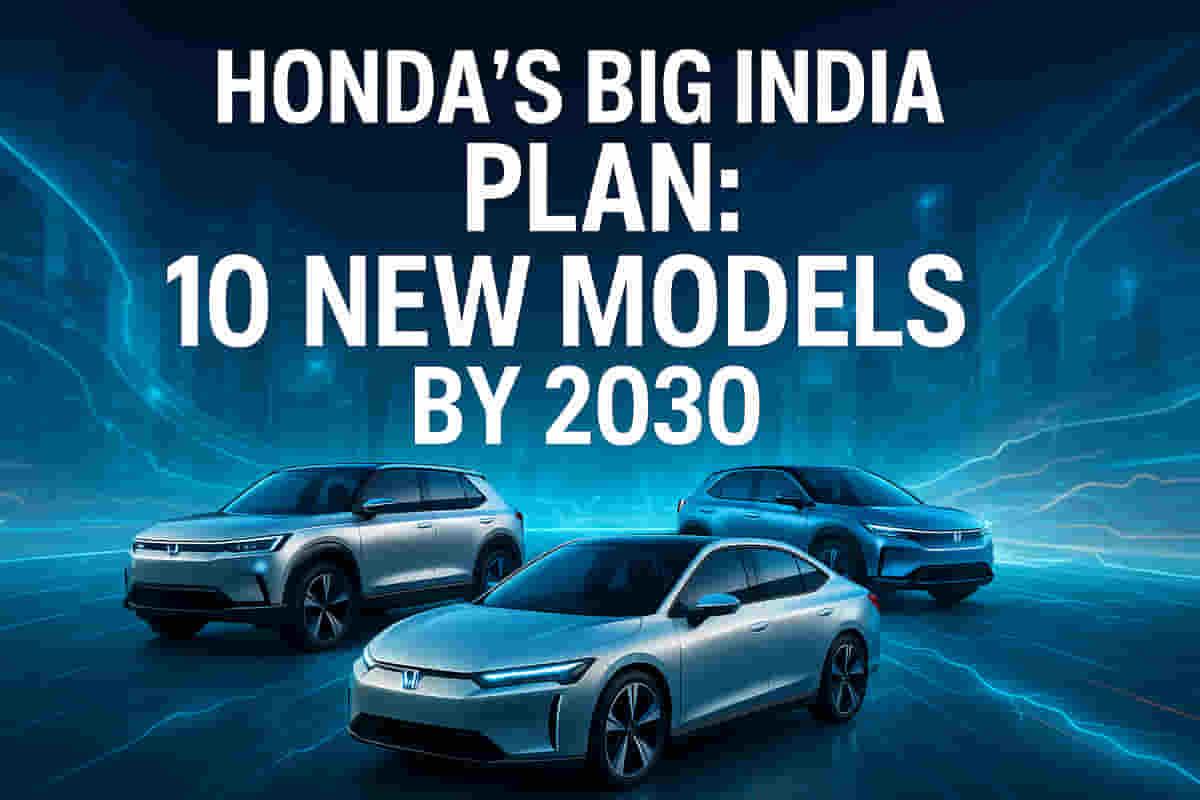Honda Plans Major India Push: 10 New Models by 2030, Including Seven SUVs
Auto
|
Updated on 31 Oct 2025, 06:55 am
Reviewed By
Aditi Singh | Whalesbook News Team
Short Description :

▶
Detailed Coverage :
Honda Motor Co., Ltd., the Japanese automotive giant, has announced an ambitious plan to introduce ten new vehicle models in the Indian market by the year 2030. This strategic expansion includes a significant emphasis on the rapidly growing SUV segment, with seven out of the ten planned models set to be SUVs. This initiative aims to bolster Honda's sales volume and enhance its market share within India's robust passenger vehicle market, which is projected to reach 60 lakh units annually by 2030. India is recognized as a top priority market for future growth, placed alongside the United States and Japan. Honda plans to bring both global premium products and locally produced vehicles to cater to diverse Indian consumer needs. The company is also looking to re-enter the competitive sub-4-meter SUV segment and will offer vehicles with multiple powertrain options, including internal combustion engines (ICE), hybrid technology, and full electric (EV) capabilities. The next-generation electric SUV, Honda 0 Alpha, is expected to launch in India by 2027, with potential for India to serve as an export hub for other Asian markets. Honda is also evaluating its production capacity in India to support these expansion plans.
Impact This aggressive product strategy from Honda is poised to intensify competition in the Indian automotive sector, particularly in the lucrative SUV and emerging EV segments. It underscores Honda's long-term commitment to India and could lead to further investment, job creation, and technological advancements in the local industry. Investors can expect a more dynamic and competitive landscape for passenger vehicles. Rating: 8/10
Terms Explained: SUVs (Sport Utility Vehicles): Vehicles characterized by their higher ground clearance, rugged styling, and often four-wheel drive capability, offering a blend of passenger car comfort and off-road utility. OEMs (Original Equipment Manufacturers): Companies that produce parts and components used in the manufacturing of other companies' final products. ICE (Internal Combustion Engine): A type of engine that converts chemical energy from fuel into mechanical energy through combustion, commonly found in petrol and diesel vehicles. EV (Electric Vehicle): A vehicle that is propelled by one or more electric motors, using energy stored in rechargeable batteries. Hybrid Vehicle: A vehicle that combines an internal combustion engine with an electric motor to improve fuel efficiency and reduce emissions. Sub 4-meter SUV: SUVs with a length of less than 4 meters, often benefiting from favorable tax structures in countries like India. Flex Fuel Vehicle: A vehicle equipped with an internal combustion engine that can run on gasoline or ethanol or any blend of these two fuels.
More from Auto

Auto
Suzuki and Honda aren’t sure India is ready for small EVs. Here’s why.
Latest News

Brokerage Reports
Stocks to buy: Raja Venkatraman's top picks for 4 November

Mutual Funds
Quantum Mutual Fund stages a comeback with a new CEO and revamped strategies; eyes sustainable growth

Tech
Why Pine Labs’ head believes Ebitda is a better measure of the company’s value

Banking/Finance
SEBI is forcing a nifty bank shake-up: Are PNB and BoB the new ‘must-owns’?

Industrial Goods/Services
India’s Warren Buffett just made 2 rare moves: What he’s buying (and selling)

Startups/VC
a16z pauses its famed TxO Fund for underserved founders, lays off staff
Renewables Sector

Renewables
Brookfield lines up $12 bn for green energy in Andhra as it eyes $100 bn India expansion by 2030
Energy Sector

Energy
India's green power pipeline had become clogged. A mega clean-up is on cards.
Renewables Sector

Brookfield lines up $12 bn for green energy in Andhra as it eyes $100 bn India expansion by 2030
Energy Sector
